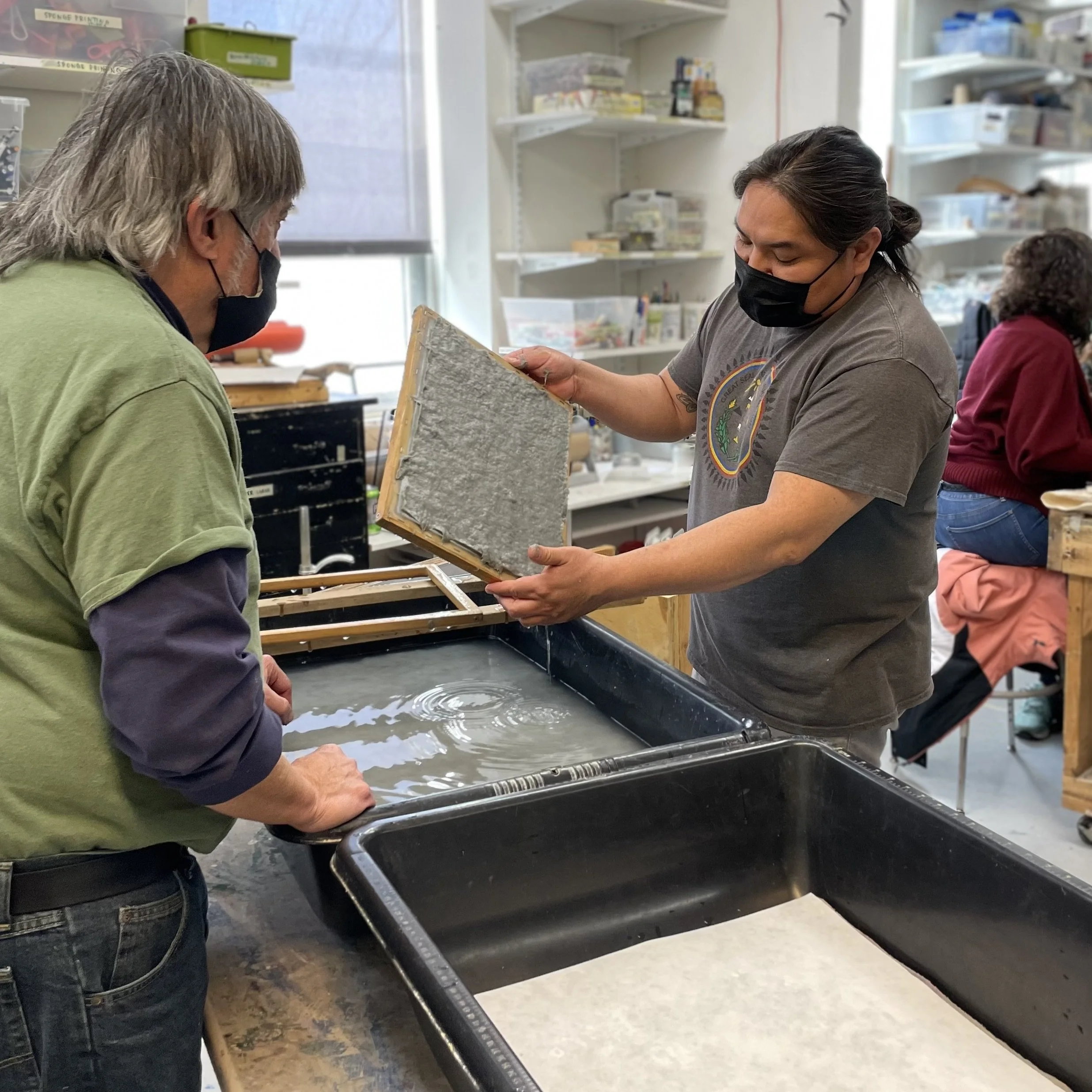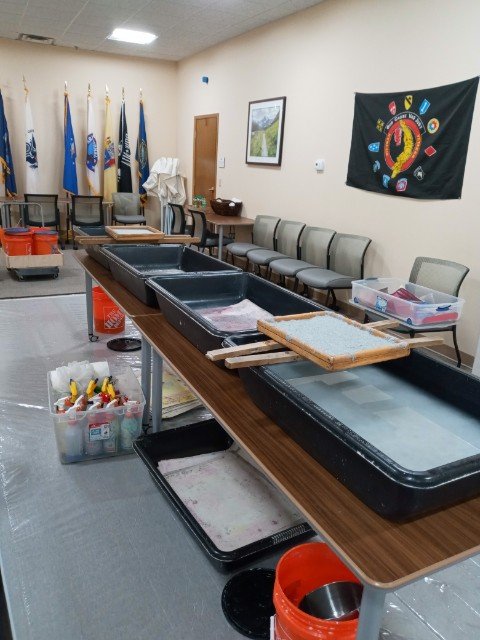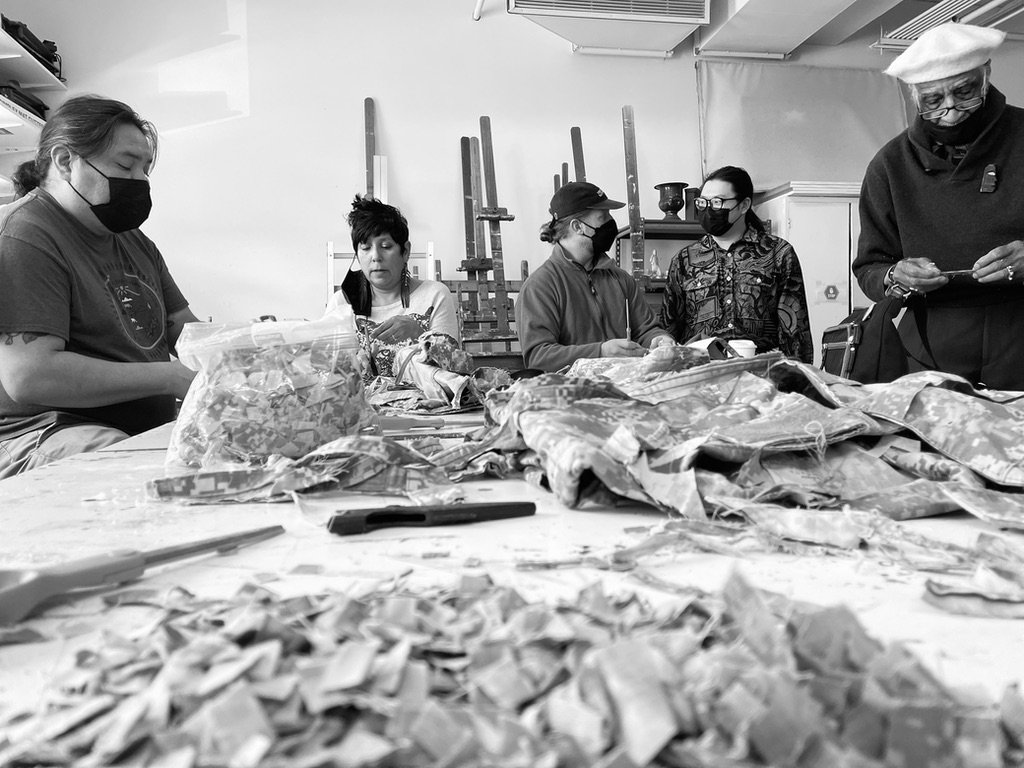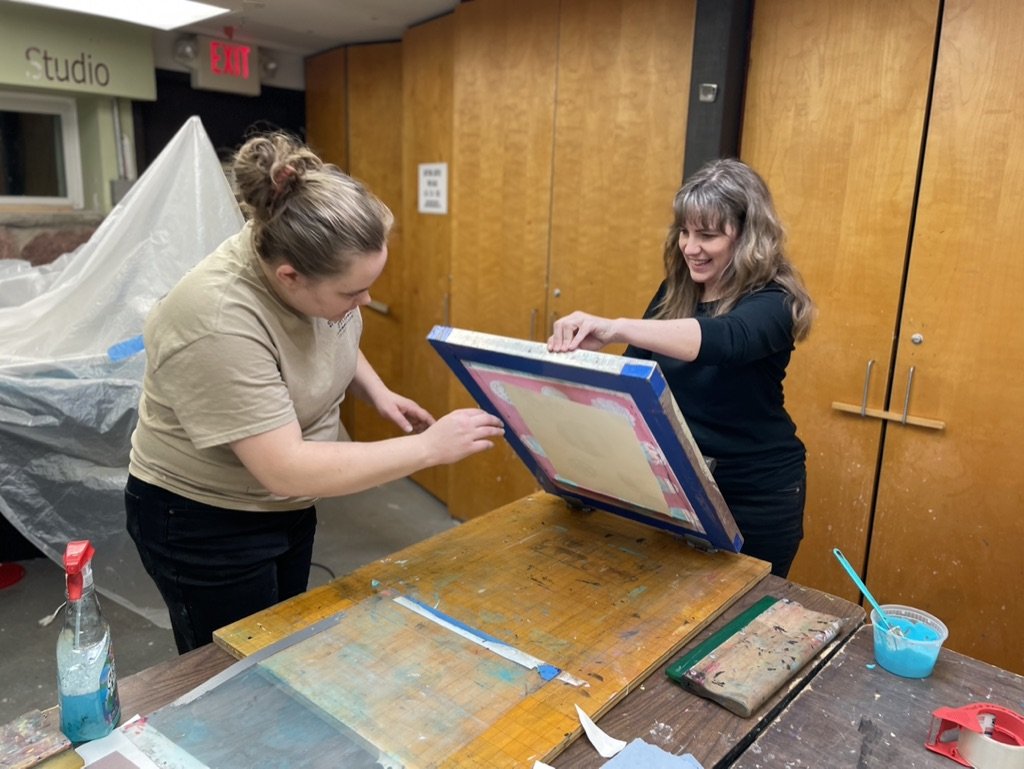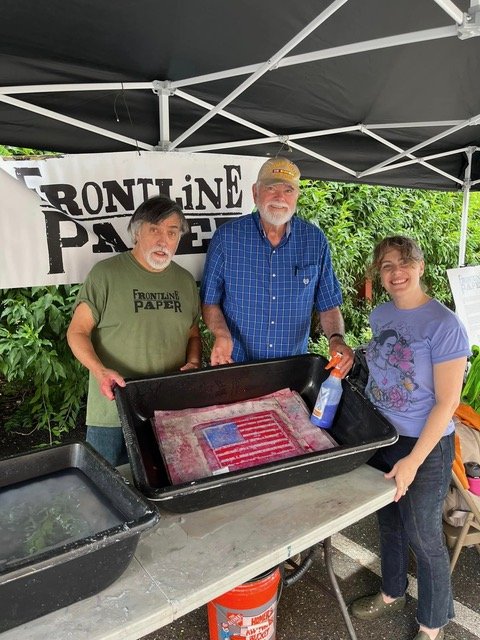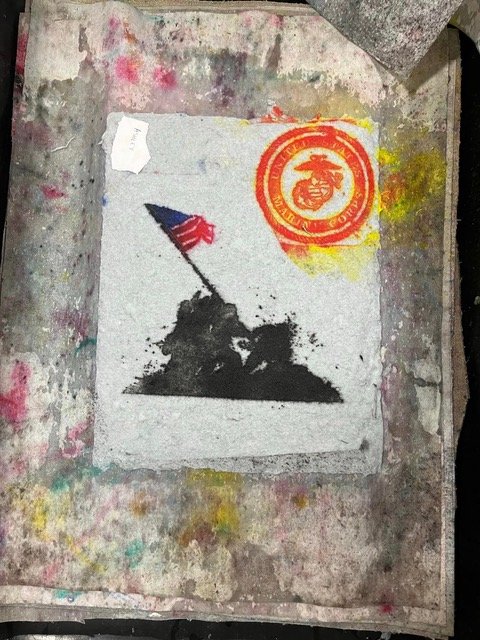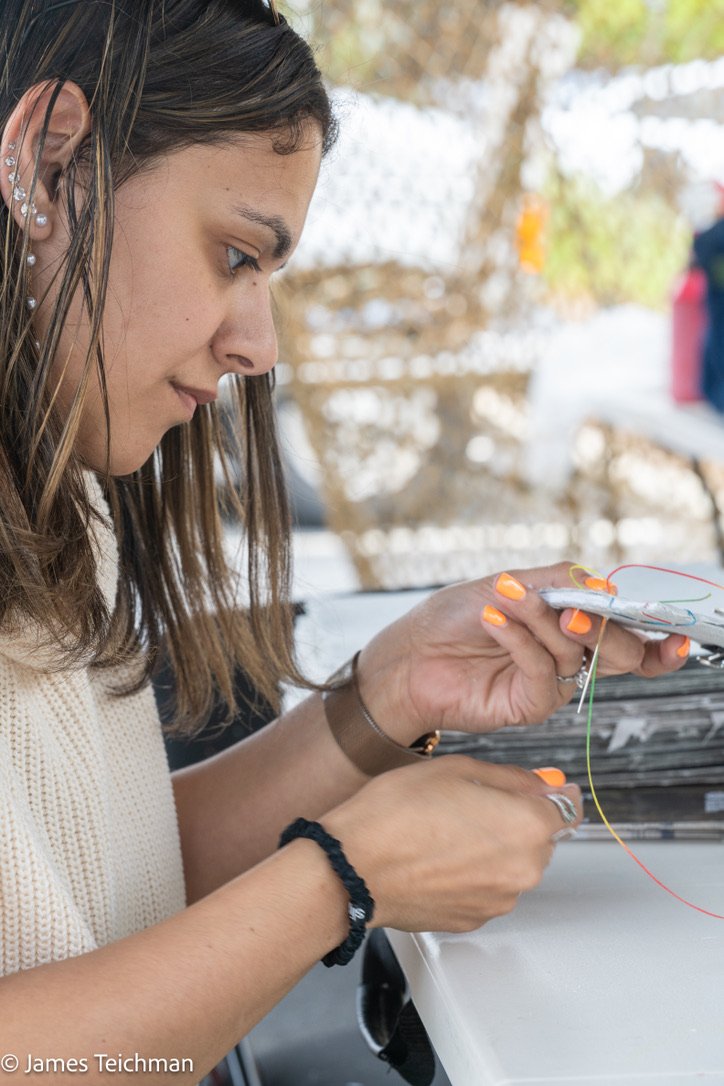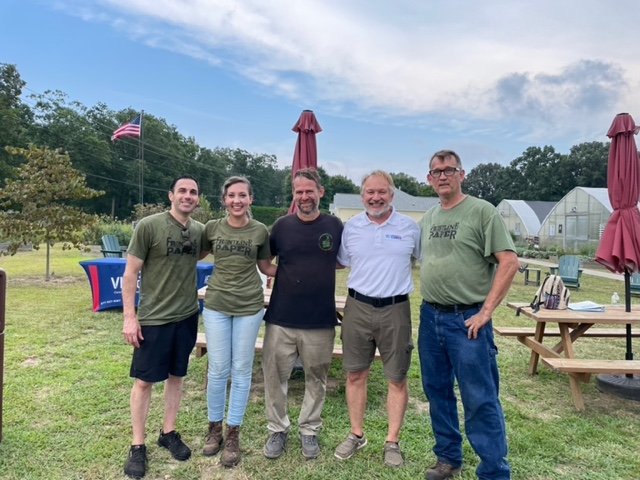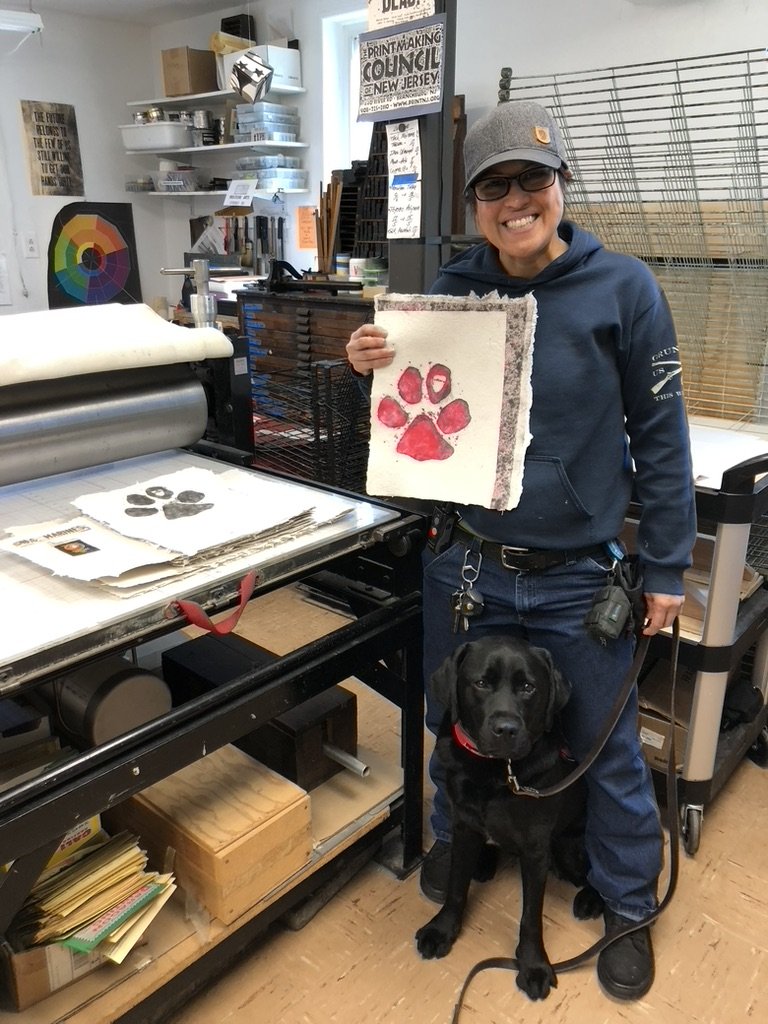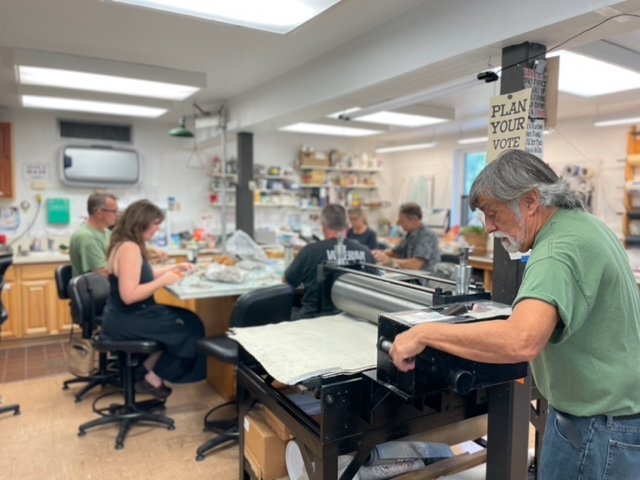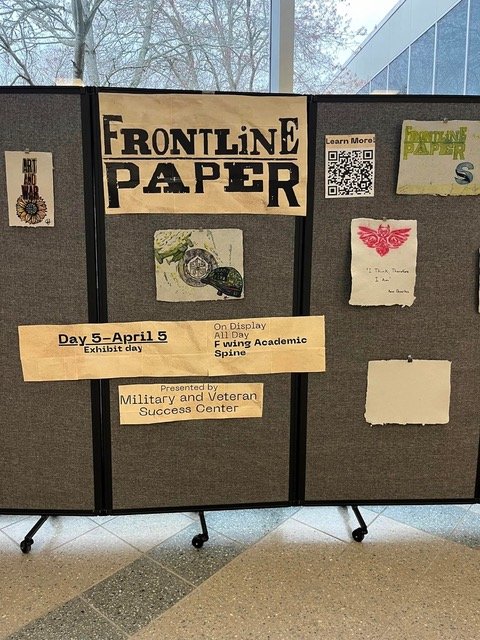Reflecting On Creative Forces - An Interview On Two Years Of Creative Forces-Funded Workshops With Frontline Paper Program Manager, Ron Erickson
How did the grant funding awarded by Creative Forces aid in developing workshops and classes at Frontline Arts?
The Creative Forces Grant allowed us to tailor various classes to teach art–making techniques or disciplines to veterans on Sundays to enhance and build upon additional techniques that can be utilized by both participants and instructors.
Veteran Artist Mark Oldland teaches Plein Air Painting at a Sunday workshop at Frontline Arts, July 2023. Photo Credit Rachel Heberling
How do you go about structuring classes? What goes into the planning process?
Has anyone commented on their experiences with their workshops to you?
The Sunday Veteran Workshops, as well as the mobile workshops, have been tried and tested since 2011. While we may have evolved slightly over time, the teaching is hands-on and the knowledge that is given has been gleaned through research and passed down over the years.
Workshop setup at South Jersey Vet Center Nov 9th, 2022 photo cred Kristin Brown
What are some difficulties that arise from hosting workshops? What aspects are most personally rewarding for you? Any other opinions or thoughts you’d like to share by looking back at the years you’ve accomplished from the start to now?
The biggest hurdle in hosting workshops is getting veteran participants. We require a strong partner wherever we go to ensure that we will have participants. I am not sure whether it’s a timing thing, a standoffishness (fear, disinterest?), a feeling of ‘I won’t cut up this uniform that I cared for while I wore it’ (there’s a real pride in the wearing and care of the uniform, so the idea of cutting it up can be seen as ”sacrilegious”). What is most rewarding is when a veteran takes that initial leap and becomes truly moved by what they do in our workshop.
Two people stand out. A Marine veteran who told us how he has two framed pictures of himself as a Marine in his living room. One he received from his children - a photo print of him in his dress whites during his time in Vietnam. The other is a picture he made in our workshop. He said, “That one, the one on the paper I made with you, that’s me.”
The other that stands out is a young Army Veteran who was a combat medic in Iraq. At the end of a five-day workshop he was able to tell a story of his having to cradle a dying soldier in his arms. There was nothing he could do. This memory had been with him for years and only now after the workshop did he tell his story. The deconstruction of the uniform around the table with others and then making paper from that rag and reclaiming that uniform as paper and making art on it allowed him to reclaim his experience in a new way where he could take control of it and not be controlled by it.
The Creative Forces Grant has allowed me to take an in-depth look at what we do, how we do it, who we are doing it with, and what for.
Participants cutting “rag”/uniform fabric for papermaking at Surviving the Long Wars Veteran Arts Summit in Chicago, March 2023. Photo credit James Teichman
In the years when you’ve started until now, how much has changed with the process and conducting of the workshops?
The workshops have essentially remained the same since I began doing them. What has changed has been my role in them.
Frontline Paper display at Surviving the Long Wars Veteran Arts Summit in Chicago, March 2023. Photo credit James Teichman
How do you accommodate students of different skill levels in workshops? Are the classes separated by level or are they open to different experiences at once?
We approach each student or participant as their own individual and assess on the fly what skills and goals each person has, and we try to tailor our teaching and help to the individual. The workshops we host are not divided by skill levels.
Staff Member Kath Yarkosky teaches vetetern artist & instructor Leslie Renn screen printing at Frontline Arts, January 2024. Photo Credit Rachel Heberling
What are the main ideas you aim to have students take away from your workshops?
The main thing we want each student to come away with is that they have a story and a voice that’s important and deserves to be heard not only by others but heard by themselves. We want to give them the needed tools with which to tell their story.
(From left to right) Instructors Ron Erickson, a participant holding artwork on military paper, James Yee and Walt Nygard stand shoulder-to-shoulder, posing for a group picture at Stockton University, April 2024.
Do you have personal favorite aspects of workshop teaching or something you feel strongly about?
I enjoy all aspects of the workshop, but teaching someone to pull a sheet of paper from the vat is the most immediately gratifying aspect.
Instructor Ron Erickson assisting a participant in pulling a sheet of paper at Surviving the Long Wars Veteran Arts Summit in Chicago, March 2023. Photo credit James Teichman
What are the important aspects of teaching art that you feel are needed when teaching?
It’s important to really know through experience what you are teaching so that when participants are experiencing difficulties you can understand why and direct an approach to a solution.
Instructors Walt Nygard (left) and Leslie Renn (right) with participants at South Jersey Vet Center, June, 2023
What does art mean to you?
Art is the communication of an idea. It is a story or an experience, conveyed through a sensory tool whether visual, auditory, or physical.
Pulp spray on military paper at South Jersey Vet Center workshop, May 9, 2023
If provided more resources, what would you like to do with the additional support in regards to developing your classes? Would you choose to bring in more supplies, travel further, hire new types of teachers, etc?
I would love to have unlimited resources to help others start papermaking, printmaking and book arts operations around the country. Off the top of my head, I can think of three places where if there was a paper beater made available we could conceivably start operations almost immediately.
A vet center staff participant uses a needle and thread to bind a book with military paper at a Secaucus Vet Center workshop, May 2024. Photo credit James Teichman
To both, how would you say your teachings are similar and different to one another?
Interesting question. We complement each other well and having worked together so closely for 6 years we work as a team so well. I am a bit more calculating and methodical than Walt Nygard (longtime Frontline Paper Program Manager and instructor), but Walt is so experienced in his method which is based in feeling and thorough knowledge, which works as well.
How do your classes allow you to tap into your background as a veteran? How does it help connect with students who may have also served in the military as well?
My background as a veteran has helped because my time in service really taught me about teamwork and mission. As a veteran, I have immediate credibility with other veterans.
Instructors Walt Nygard and Dennis Beerley, on right, showing pulp spray to Pparticipants at a South Jersey Vet Center workshop, May 2023
Being a traveling workshop, you both must have worked with various institutions and locations, for example with our partnership with the South Jersey Vet Center. How did such a collaboration come to be, and how has the growing partnership aided everyone involved?
The collaboration with South Jersey Vet Center was meant to be. We had just tabled at Hudson Yards with Warner Media for the film This Is Not a War Story in September of 2021. Warner Media saw what we did and understood its relevance, and offered us the opportunity to immediately apply for a grant. Rachel was absolutely phenomenal in her uptake of this offer and we received a grant to do 5 workshops. No sooner had we received this grant when we received a call from Dave Mullen at South Jersey Vet Center asking how he might get us to come to them to do a workshop.
We ended up bringing two workshops to them - another to Secaucus Vet Center, and then hosted a day at our studio.
South Jersey got a grant of their own to bring us to them again, and they became our clinical partner for the Creative Forces Grant.
From left to right, Frontline Paper veteran instructor James Teichman, Executive Director Rachel Heberling, a participant, Dave Mullen, Outreach Specialist at South Jersey Vet Center, and Frontline Paper Program Manager Ron Erickson, at a workshop at A Meaningful Purpose at Reed’s Farm, September 2023.
It has aided everyone in that we’ve reached over 100 Veterans with our process under this grant, and I can say that it has significantly impacted at least 4 of them that I am sure of, and most likely more that I don’t even know about. Multiple veterans have specially told me how affected they’ve been by the process of making paper and art on that paper.
What does community mean for you?
Community to us means being part of a group with shared experiences that bring us closer as individuals.
Artist Instructor Neal Korn, on right, teaches drawing to veteran program instructors and particpants (from left to right, James Teichman, James Yee and Tara Krause).
What drives you to provide an artistic environment for other veterans with the papermaking workshops you help teach?
My motivation to bring art to other veterans is a desire to give them much-needed tools with which they can make something that helps them communicate their stories and find a place in the world.
What does the word ‘empowerment’ mean to you?
Empowerment to us means having the ability to be who we are wherever we are and to be able to exist honestly in the world.
Visiting veteran artist Dani Figueroa receives private workshop instruction to make her own uniform pulp and paper (and a paw print) with her service dog, Valor, April 2023.
To you, what are the benefits of the arts to a community?
The benefits of the arts to a community is to create a dialogue and to perhaps bring up certain topics for discussion that can’t be said in normal conversation for a host of reasons.
Participants and instructors cutting rag around the table and pulling prints on an etching press in a Sunday workshop at Frontline Arts, August 2023
Describe the activities supported by this grant.
This grant supported the ongoing Sunday Workshop for Veterans at Frontline Arts on Sundays for 2 years, from July 2022 through June 2024. It enhanced the Sunday Workshop by providing classes in bookmaking, silkscreen, writing and letterpress.
Letterpress workshop taught by veteran artist Dennis Beerley, on right. From left in doorway Walt Nygard, Carsten Bahl, James Teichman (with print), Ron Erickson, and Dennis. Photo credit Rachel Heberling
The Grant supported the ongoing development of a relationship with the South Jersey Vet Center and the community it serves in Egg Harbor/Atlantic City. Not only did we do papermaking with the Veterans at their Vet Center, but we were also able to do a workshop at the nearby Reed’s Farm with one of the SJVC Veterans as our host at the farm. This workshop had us working with the community at large which included developmentally diverse individuals as well as Retired Law Enforcement, and Veterans from the local community. We also were given the opportunity to go to Chicago and participate in the BIPOC-centered “Surviving the Long Wars Veteran Art Summit” working with several indigenous veteran artists from across the country. We also were able to bring a five-day Workshop to Stockton University.
We finished our last Workshop at the South Jersey Vet Center working with Women Veterans on Women Veterans Day on June 12th, 2024. The grant enabled us to bring Leslie Renn, one of our longtime facilitators up from Virginia, to help facilitate this Workshop. It is important to have facilitators that participants can identify with actually teaching the workshops.
Frontline Paper workshop exhibit at Stockton University, April 2024
Did the project encounter any events and/or circumstances that impeded your ability to conduct the project as planned?
I honestly have to say that though it may not have followed the intended script, it remained true to its intention and probably achieved more than originally planned and hoped for. The engagement with the greater Veteran Community beyond South Jersey Vet Center gave us fulfillment of our mission to create community and broadened our reach farther than what we might have thought about before receiving the grant. Much of that was not us doing outreach but more being willing to, and because of the Grant, being able to respond to opportunity as it presented itself. Because of our legacy from Combat Paper NJ and our ongoing work as Frontline Paper we do receive requests and opportunities all the time. We are not always able to respond or fulfill these requests, and this is normally because of financial constraints. The Creative Forces Grant removed these funding constraints.
What partners were involved in the project?
To name a few selected key teams/individuals who helped make this project the way it is now, we have:
The Creative Forces Grant team as a whole, everyone associated with our organizational partner - The South Jersey Vet Center - with key staff Dave, Shaunte, Kristin and Julie to name a few, as well as Neil and Jen at the Secaucus Vet Center, Gloves on the Ground and the folks at A Meaningful Purpose at Reed’s Farm, Ashley at Stockton University, and Aaron Hughes plus Amber Zora for the Surviving the Long Wars Triennial Veteran Art Summit in Chicago
And key veteran and artist instructors such as:
James Yee, Ron Erickson, Walt Nygard, James Teichman, Leslie Renn, Maureen Cummins, Neal Korn, Mark Oldland, Dennis Beerley, Kevin Basl, Kath Yarkosky and Rachel Heberling.
Frontline Paper Studio Manager Walt Nygard on left, and Program Manager Ron Erickson, on right, pull an oversized sheet of military paper at a Sunday workshop at Frontline Arts, July 2023.
Thank you to our Frontline Paper program supporters:
Creative Forces® initiative, in partnership with Mid-America Arts Alliance.
Creative Forces Community Engagement Grants are part of the National Endowment for the Arts. To find out more about how National Endowment for the Arts grants impact individuals and communities, visit www.arts.gov.
For more information on Frontline Arts and its mission, please visit:
https://www.frontlinearts.org/mission
For more information on the Frontline Paper program, please visit: https://www.frontlinearts.org/frontline-paper
Interview by Hugo Gatica, July 2024

